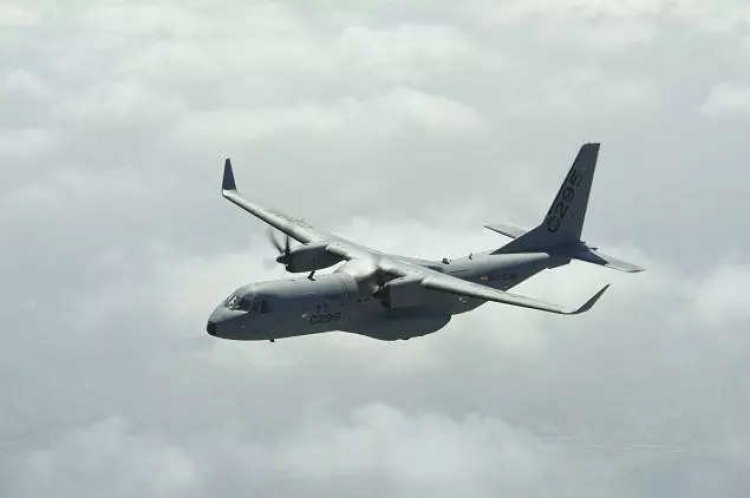Big Defence Push: India Nod for $3-Billion Airbus Cargo Planes, to be Made Locally
STORIES, ANALYSES, EXPERT VIEWS

In what could be a game-changer decision for India’s defence sector, Prime Minister Narendra Modi on Sep. 8 approved the purchase of a possible $3 billion-worth 56 Airbus C-295MW aircraft with troops and military equipment carrying capability to replace an aging fleet of HS748 Avro planes for the air force.
India’s Minister of Defence told journalists at an event on Sep. 9 near Barmer in Rajasthan that the estimated value of the contract, when signed would be Rs 22,000 crore ($3 billion).
The decision could have far-reaching, historical implications for India’s defence sector. This will be India’s first private sector project for manufacturing of military aircraft, to be executed by Tata Group, with support from European aerospace major Airbus, effectively ending the over 70 years of monopoly of state-run Hindustan Aeronautics Limited.
When signed, this will also be the first ever military contract that Airbus has bagged in India. But for that history page to be turned, we have to wait just a week or more longer, defence sources told Defence.Capital.
Airbus has waited on the sidelines for nearly 60 years for at least one defence contract to be in its kitty, even as India had selected the company’s products as the lowest bidder in more than two tenders that got scrapped.
These failed bids for Airbus include the light utility helicopters to replace the Chetaks and Cheetahs and for the midair refuellers to enhance the endurance of several Indian Air Force (IAF) aircraft.
“Today, (the) Cabinet Committee on Security (led by Modi,) approved the procurement of fifty six C-295MW transport aircraft from M/s Airbus Defence and Space S.A., Spain for the Indian Air Force,” a Ministry of Defence statement after the CCS meeting said.
“(The) C-295MW aircraft is a transport aircraft of 5-10-tonne capacity with contemporary technology that will replace the ageing Avro aircraft of IAF. The aircraft has a rear ramp door for quick reaction and para dropping of troops and cargo,” the statement said.
“Airbus welcomes the decision of the Cabinet Committee on Security on the procurement of 56 C-295 aircraft and looks forward to signing and executing the contract jointly with the Tata Group,” the European company said in a statement, post the defence ministry announcement of the CCS approval for the C-295 project.
According to the procurement plan, 16 of the C-295s — powered by two Pratt & Whitney Canada PW127G turboprop engines that are part of the PW100 family — will be delivered directly to the IAF, in flyaway condition from Spain within 48 months of signing of the contract.
Another 40 aircraft will be manufactured in India by TATA Consortium within 10 years of signing of the contract. This means, it will take 12 years in all for the IAF to induct the entire 56 aircraft fleet and replacing the now ageing Avro planes.
“This is the first project of its kind in which a military aircraft will be manufactured in India by a private company. All fifty six aircraft will be installed with indigenous Electronic Warfare Suite,” the defence ministry statement said.
“The project will give a boost to aerospace ecosystem in India wherein several MSMEs (Micro, Small and Medium Enterprises) spread over the country will be involved in manufacturing of parts of the aircraft.”
Driving Self-Reliance: The statement also said the project will be a major boost to the ‘Atmanirbhar Bharat‘ (Self-Reliant India) initiative of the Indian government, as it offered a unique opportunity for the Indian private sector to enter into technology intensive and highly competitive aviation industry.
The project will augment domestic aviation manufacturing resulting in reduced import dependence and expected increase in exports. A large number of detail parts, sub-assemblies and major component assemblies of aero structure are scheduled to be manufactured in India.
The programme will act as a catalyst in employment generation in the aerospace ecosystem of the country and is expected to generate 600 highly skilled jobs directly, over 3,000 indirect jobs and an additional 3,000 medium skill employment opportunities with more than 4.25 million (42.5 lakh) man hours of work within the aerospace and defence sector of India.
It will involve development of specialised infrastructure in the form of hangars, buildings, aprons and taxiway. During the process of manufacturing in India, it is expected that all the suppliers of TATA Consortium who will be involved in special processes will gain and maintain globally recognised National Aerospace and Defence Contractors Accreditation Program (NADCAP) accreditation.
Before completion of deliveries, ‘D’ Level servicing facility (Maintenance Repair and Overhaul or MRO) for C-295MW aircraft are scheduled to be setup in India. It is expected that this facility will act as a regional MRO hub for various variants of C-295 aircraft.
In addition, the Original Equipment Manufacturers will also discharge its offset obligations through direct purchase of eligible products and services from Indian offset partners giving further boost to economy.
“This programme is a unique initiative of Government of India to strengthen indigenous capabilities and boost ‘Make in India’.“
Road to Fruition: The IAF got approvals for its requirement to replace the existing fleet of Avros with a modern cargo aircraft in 2012. After tendering, in 2014, the project got stuck due to a single-vendor situation, a no-go under the then Defence Procurement Procedure, as only Airbus had responded in partnership with the Tata Group, offering its C-295.
Several global aviation companies such as the American Lockheed Martin, Ukraninan Ilyushin, Brazilian Embraer, Italian Alenia Aeronautica and Swedish Saab AB reportedly did not respond.
The defence ministry cleared the single-vendor offer in 2015 during a Defence Acquisition Council meeting, as no other viable proposal were coming for building the required aircraft of 5-tonne to 10-tonne category, following which negotiations for the contract began between the Airbus-Tata consortium and the ministry-air force officials.
Since 2017, there have been several false starts regarding the C-295 procurement proposal going to the CCS for approvals, but for some questions here or there, on costs and possible upgrade to the existing fleet of Avros by HAL and such, from the defence ministry, stalled the process of decision-making. Those concerns were set aside before putting the air force’s C-295 acquisition proposal up for a nod at the highest decision-making body on national security affairs.
Though an Indian Coast Guard requirement for six C-295s too had come up before the defence ministry, that proposal may be taken up later for approvals and those orders licence-manufactured in India at the Tata-Airbus facility that will come up.
(Courtesy: Defence.Capital)
















